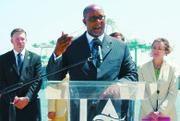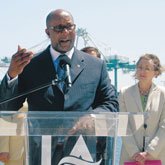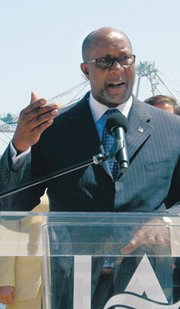Obama Administration Pushing Swift Passage of Free-Trade Pacts
The three pending free-trade agreements with South Korea, Colombia and Panama should be ready to be introduced to Congress soon after lawmakers return from their summer break on Sept. 6.
The Obama administration is pushing hard to get the accords approved, particularly after the European Union’s free-trade accord with South Korea was launched and Canada now has a free-trade accord with Colombia.
“The free-trade agreement between Europe and Korea went into effect July 1, and already Europe’s exports to Korea are up 17 percent in 45 days,” said U.S. Trade Representative Ron Kirk, who was touring the Port of Los Angeles on Aug. 16 aboard the Angelena II, the port’s 40-passenger harbor tour boat. Kirk was making a whirlwind tour through California, meeting with exporters in Los Angeles, San Francisco and Sacramento and trying to spread the word that free-trade agreements are, indeed, good for the United States.
He noted that these free-trade accords, signed under the Bush administration, would add $12 billion a year to the United States’ gross domestic product and increase U.S. exports by $10 billion to $11 billion.Joining Kirk on the boat tour were Geraldine Knatz, executive director of the Port of Los Angeles, and Richard Steinke, executive director of the Port of Long Beach.
The port executives stressed the need to improve infrastructure if new free-trade agreements boost cargo traffic at the two ports, which now handle about 43 percent of all goods brought in across the ocean.Knatz pointed out the dredging project at the Evergreen terminal will deepen the water to a depth of 53 feet. Three more of the port’s eight cargo terminals have to be dredged before the $400 million project is complete, Knatz said. The deeper water allows larger ships carrying 15,000 20-foot (TEU) containers to dock, whereas smaller ships in the 6,000 to 8,000 TEU category have been predominant in the past.Newly elected U.S. Rep. Janice Hahn (D.–Calif.)—whose district covers Redondo Beach, Manhattan Beach and San Pedro—was on hand for the tour as well as U.S. Rep. Laura Richardson (D.–Calif.), whose district covers Compton, Carson and parts of Long Beach. However, the ports are in the district of U.S. Rep. Dana Rohrabacher (R.–Calif.). At a press conference after the one-hour boat tour, Kirk outlined the timeline for getting the free-trade agreements passed.First, the Obama administration will introduce the Trade Adjustment Assistance program, a $1 billion retraining program for U.S. workers who lose their jobs because of the new free-trade agreements. The president has been adamant that the job-retraining program, which expired in February, be implemented before the free-trade accords are introduced. Once the Republican-controlled House of Representatives approves the retraining program, the legislation will be sent to the Democrat-controlled U.S. Senate. Then, the White House will send the three free-trade agreements to the House and Senate for an up-or-down vote to be completed within 90 days.“One of the things we can do right now is make sure we take advantage of the opportunities to find new homes for what we grow, raise, create, innovate and make in America to our partners and friends around the world,” Kirk said, noting that South Korea is a major trading partner that can only grow when the average 17 percent tariff is eliminated on most goods traded between the two countries.However, U.S. labor unions have been concerned that many of their jobs will be exported overseas. In addition, labor unions have opposed a pact with Colombia, where, they allege, 51 labor unionists were killed in 2010. Just outside the press conference, a small group of people representing the Colombia Peace Project held up signs protesting the pact with Colombia. They also handed out a letter sent in June to Congress and signed by 431 organizations and individuals opposing the Colombian free-trade agreement because of labor-rights abuses.However, the United States in April negotiated a Labor Action Plan with Colombia to hire 480 new labor inspectors over a four-year period to inspect factories. Colombia is also supposed to improve the system for citizens to file complaints. “Colombia has come a very long way to transform their society from where workers have been exploited,” Kirk said. “Do we stay on the sidelines until everything is perfect or leverage this free-trade agreement with this country?”
























